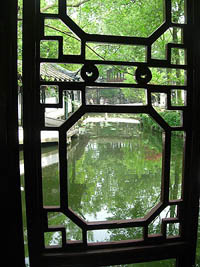| Tools: Save | Print | E-mail | Most Read |
| Serenity with Convenience |
| Adjust font size: |
What exactly is wrong with these neighboring cities that would make people so dismissive? True, these places in As a relative newcomer to the city, the newly fangled CRH bullet trains were the first form of rail travel I have done in the country. The verdict? They are fantastic. Comfortable, spacious and quick to boot - The scene that awaits around Suzhou Train Station cannot be described as pretty. After the pleasant train ride to promised serenity, the cacophony of renovation and road works leads you to wonder if you ever left Thankfully all that is put behind once the locus of arrival is out of earshot. The cradle of Wu culture is less developed than In fact, Given such circumstances, it would be a grave injustice to the once-thriving metropolis of industry and commerce in the southeastern coast of Gondolas are obviously the preferred choice for travelers seeking an authentic experience, but the motorized boats travel further from the more touristy areas. A voyage from tourist spot There is an obvious otherworldliness during such a jaunt. The calm, well-spaced lights embedded in the stone bank reflect idly on the unfathomable water as passengers peer vicariously at ordinary citizens carrying on with their lives. After the day-to-day scrum that is big city living, such mellow quiescence is greatly appreciated. In the waking hours, however, there is also plenty of leisure to be had. "The Unfortunately, visitors to these sightseeing spots may find themselves struggling with the pack of tourists that descend upon these opulent oases. The point of peace is lost on many as tour leaders blare quick descriptions that do not really mean anything over loudhailers as they trespass through the premises. It is possible to find respite, if only for a while, in the more secluded corners, and enjoy the beautifully landscaped flowerbeds and stone ornaments. Birds chirp happily away and insects buzz busily about. One almost feels disinclined to swat them away. Almost. Next to the Zhuo Zheng Yuan is the iconic Inside holds a modest collection of art, ranging from local favorite ink wash paintings to calligraphy, as well as antiques such as ancient pottery and handmade crafts. Not as impressive as the building itself, but still worth viewing. After all that trekking, a meal is in order. Song He Lou is one of the more popular establishments, with an impressive history of more than 100 years. Jiangnan (Regions south of the Yangtze River) cuisine is mainly river fare, with the surrounding At this juncture a stiff drink is probably in order, so a quick hop over to If you are looking for luxurious lodgings, then the newly opened Shangri-La Hotel Suzhou is just the ticket for a hot bath and a sound sleep, along with other five-star amenities, among them a state-of-the-art gym, swimming pool with steam and sauna rooms, a tennis court and mini-golf course. The first international deluxe hotel in the city's New and Hi-Tech Development Zone occupies the 28th through 51st floors of the looming Food and beverage outlets are also aplenty, meaning if you want to miss what the city has to offer and stay in, you can. The all-day diner Cafe Soo offers international buffet, Hotel bars are far from popular across Asia, but given Admittedly, it would be a waste not to see more of the Chinese mainland; the country offers such diverse beauty across an amazing vastness. However, that being said, coming to (Shanghai Daily by Aubrey Buckingham July 4, 2007)
|
| Tools: Save | Print | E-mail | Most Read |
 |
| Related Stories |
|
|
Product Directory China Search |
Country Search Hot Buys |
